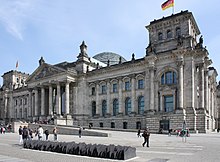Fritz Bockius (politician)
Friedrich "Fritz" August Bockius (born May 11, 1882 in Bubenheim (Rheinhessen) ; † March 5, 1945 in Mauthausen concentration camp ) was a German lawyer and politician ( center ).
Life
Fritz Bockius attended elementary school in Bubenheim, then Progymnasium in Dieburg and grammar school in Bensheim. He then studied theology for seven semesters at the Mainz seminary . He later changed his subject and studied law at the University of Giessen . There he joined the VKDSt. Hasso-Rhenania and received his doctorate in 1909 as Dr. iur. After his legal clerkship, which he also spent in Gießen, Bockius settled in Mainz as a lawyer in 1912 .
After the First World War , Bockius began to become increasingly involved in the Catholic Center Party. Since 1919 he belonged to the district council and the district committee of Mainz. In 1920 he was elected chairman of the regional association of the Center Party of Hesse .
In May 1924 , Bockius was elected as his party's candidate for constituency 33 (Hessen-Darmstadt) as a member of the Reichstag in Berlin. In the six subsequent Reichstag elections, his mandate was always confirmed, so that he was a member of the German parliament for almost nine years up to November 1933. In the spring of 1932, on behalf of Heinrich Brüning , the then Reich Chancellor and de facto leader of the center, Bockius tried to form a coalition of the center and the National Socialists in Hesse. The project ultimately failed.
Although Bockius was an opponent of the Enabling Act , which in future gave the Hitler government the power to pass laws independently of the Reichstag, he agreed to it in March 1933, as he did not comply with the principle of parliamentary party compulsion, i.e. H. wanted to break the uniform voting behavior of all members of a parliamentary group. In the same year he was arrested for the first time and temporarily held in the Osthofen concentration camp . Since the new rulers declared Bockius to be a non-person , he was soon no longer able to practice his profession as a lawyer - although he was not subject to any professional ban. There were no longer any clients who dared to use his services.
After the assassination attempt on July 20, 1944 , Bockius was arrested by the Gestapo in August 1944 as part of the "Grid" campaign . After he was initially held in Darmstadt prison, he was transferred to Sachsenhausen concentration camp in December 1944 and to Mauthausen concentration camp in February 1945. Because of the inadequate and poor food in Mauthausen, Bockius fell ill with dysentery . According to later information from a fellow inmate, Bockius was initially transferred to a well-equipped military hospital in Mauthausen, which was shown to visitors as a sample for the camp equipment, and there he was treated with morphine by a inmate nurse. Because of the contagious disease, the senior camp doctor had him moved to an overcrowded tent outside the camp, where Bockius also contracted pneumonia and died in March 1945.
Honors
- The Catholic Church has Dr. Friedrich August Bockius was included in the German martyrology of the 20th century .
- In his hometown Mainz a street is named after Bockius.
- Since 1992 one of the 96 memorial plaques for members of the Reichstag murdered by the National Socialists has been commemorating Bockius in Berlin near the Reichstag .
Fonts
- The criminal law significance of the international treaties on copyright in works of literature and art , Berlin 1910. (Dissertation)
- Revaluation Policy , 1924.
- Helmut Moll (publisher on behalf of the German Bishops' Conference), witnesses for Christ. The German Martyrology of the 20th Century , 6th, expanded and restructured edition Paderborn u. a. 2015, ISBN 978-3-506-78080-5 , Volume I, pp. 445-448.
Web links
- Literature by and about Fritz Bockius in the catalog of the German National Library
- Fritz Bockius in the database of members of the Reichstag
- Bockius in the files of the Reichstag Chancellery
- Documentation about Fritz Bockius (PDF file; 5.1 MB)
Individual evidence
- ↑ See Martin Schumacher (Ed.): MdR The Reichstag members of the Weimar Republic in the time of National Socialism. Political persecution, emigration and expatriation 1933–1945. Droste-Verlag, Düsseldorf 1991, ISBN 3-7700-5162-9 , p. 128.
| personal data | |
|---|---|
| SURNAME | Bockius, Fritz |
| ALTERNATIVE NAMES | Bockius, Friedrich August |
| BRIEF DESCRIPTION | German lawyer and politician (center), MdR, lawyer and Nazi victim |
| DATE OF BIRTH | May 11, 1882 |
| PLACE OF BIRTH | Bubenheim (Rheinhessen) |
| DATE OF DEATH | March 5, 1945 |
| Place of death | Mauthausen concentration camp |

